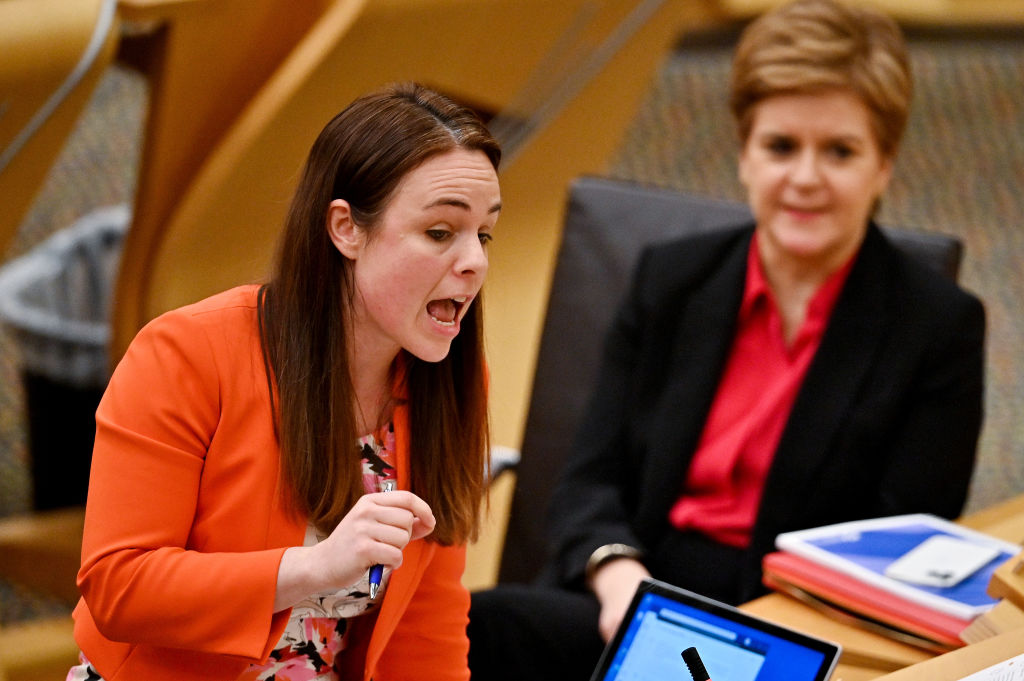The Conservative morality of Kate Forbes will never lead Sturgeon’s party

People who oppose Kate Forbes’ leadership are not intolerant, just realistic. A social conservative can’t lead a socially liberal party, in the same way a pro-European can’t lead Eurosceptics, writes Will Cooling
The past few days have seen the Scottish National Party convulsed by the backlash to the socially conservative views of Finance Minister and leadership candidate Kate Forbes.
A member of the evangelical Free Church of Scotland, Forbes has been blunt about her beliefs on abortion, homosexuality, and sex outside of marriage. Most strikingly, she admitted that had she been in Holyrood at the time, she would have voted against the legalisation of same-sex marriage. For this she has been extensively criticised, with some of her early backers withdrawing their support. This has led some, including Forbes herself, to suggest that such criticism shows an intolerance towards religious minorities. This ignores the many religious politicians, including fellow Free Church member and the SNP’s former Westminster leader Ian Blackford, who have criticised Forbes.
What complicates this issue is the widespread belief that social issues should be matters of conscience where individual MPs are given the freedom to vote in line with their personal beliefs. This, however, misunderstands the history. Such free votes were first offered as a mutual disarmament pact between the major parties in order to pass liberalising legislation. Placing these issues “above party politics” reassured social moderates that such measures couldn’t be demonised by their political opponents and provided social conservatives with the freedom to vote as they desired.
Crucially, as Labour became more unapologetically socially liberal it broke with this practice, frequently not just including liberalising measures within its manifestos, but whipping its MPs to vote in line with what the leadership saw as key principles of the party.
A big reason for this change is that public opinion has changed, with views such as those held by Kate Forbes becoming increasingly held by a very small minority of Britons. That is doubly true for the SNP whose membership has become more left-wing as it successfully defined the wider nationalist project against English Toryism. It must be slightly disorientating for someone like Forbes to realise what were once commonplace positions have become politically toxic.
But this happens all the time in politics. It just feels more fraught because it touches upon religion, and the changes in attitudes have been so rapid. Take instead the question of pro-Europeanism. Like social issues this used to be an issue that cut against party lines with both Labour and the Tories having a significant Eurosceptic minority. Gradually the two parties polarised on the issue, as Labour became more pro-European and the Tories more Eurosceptic. But in a cruel quirk, perhaps Britain’s most outspoken Europhile was left marooned in the wrong party.
Just like how Kate Forbes passionately believes in Scottish independence, Ken Clarke really is very Conservative. In his prime he was a Thatcherite bruiser who provoked a bitter strike with nurses as Health Secretary and significantly cut public spending as Chancellor. But he hid that steel beneath an easy-going veneer that meant even committed anti-Tories found him difficult to dislike. He would’ve been perfect to rebuild the party after either of their landslide defeats, especially when the alternatives were a callow William Hague or Iain Duncan Smith. But he could never find a way to overcome the fact that he and his party bitterly disagreed on the issue of Europe. Clarke would come out with all sorts of gimmicks and fudges to bridge the gap, but there simply wasn’t a way to make it safe or coherent for him to lead their party.
The same is true of Kate Forbes today. Kate Forbes can say that she recognises that issues such as same-sex marriage and abortion have been settled by past legislation, but other social issues will arise, and her political belief that it’s the role of government to impose conservative morality on all its citizens would shape her administration’s decisions. Indeed, she has already said that she would abandon Nicola Sturgelon’s plans to challenge the British Government veto of Scotland’s reforms to the Gender Recognition Act.
People who oppose Forbes’ leadership are not being intolerant, just realistic. A social conservative cannot lead a socially liberal party, any more than a Pro-European can lead a Eurosceptic one. Whereas outliers can be tolerated elsewhere on the frontbench, agreeing with your party on key issues is a genuine occupational requirement of leadership.
For all the latest Lifestyle News Click Here
For the latest news and updates, follow us on Google News.

